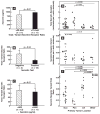Secretin-receptor and secretin-receptor-variant expression in gastrinomas: correlation with clinical and tumoral features and secretin and calcium provocative test results
- PMID: 17711922
- PMCID: PMC2464459
- DOI: 10.1210/jc.2007-0986
Secretin-receptor and secretin-receptor-variant expression in gastrinomas: correlation with clinical and tumoral features and secretin and calcium provocative test results
Abstract
Context/objectives: The diagnosis of Zollinger-Ellison syndrome requires secretin testing in 60% of patients. Even with secretin, the diagnosis may be difficult because variable responses occur, and 6-30% have negative testing. The basis for variability or negative responses is unclear. It is unknown whether the tumor density of secretin receptors or the presence of a secretin-receptor-variant, which can act as a dominant negative, is important. The aim of this study was to investigate these possibilities.
Patients/methods: Secretin-receptor and variant mRNA expression was determined in gastrinomas using real-time PCR from 54 Zollinger-Ellison syndrome patients. Results were correlated with Western blotting, secretin-receptor immunohistochemistry, with gastrin-provocative test results and tumoral/clinical/laboratory features.
Results: Secretin-receptor mRNA was detectible in all gastrinomas but varied 132-fold with a mean of 0.89 +/- 0.12 molecules per beta-actin. Secretin-receptor PCR results correlated closely with Western blotting (r = 0.95; P < 0.0001) and receptor immunohistochemistry (P = 0.0015; r = 0.71). The variant was detected in all gastrinomas, but levels varied 102-fold and were 72-fold lower than the total. Secretin-receptor levels correlated with variant levels, Deltasecretin, but not Deltacalcium and with tumor location, but not growth, extent, or clinical responses. Variant levels did not correlate with the Deltasecretin. Detailed analysis provides no evidence that variant expression modified the secretin-receptor response or accounted for negative tests.
Conclusions: Secretin-receptor and secretin-receptor-variant expressions occur in all gastrinomas. Because the expression of the total, but not variant, correlated with the secretin results and no evidence for dominant negative activity of the variant was found, our results suggest that the total secretin-receptor density is an important determinant of the secretin test response.
Figures



References
-
- Jensen RT, Doppman JL, Gardner JD. Gastrinoma. In: Go VLW, Brooks FA, DiMagno EP, Gardner JD, Lebenthal E, Scheele GA, editors. The Exocrine Pancreas: Biology, Pathobiology and Disease. 1. New York: Raven Press; 1986. pp. 727–744.
-
- McGuigan JE, Wolfe MM. Secretin injection test in the diagnosis of gastrinoma. Gastroenterology. 1980;79:1324–1331. - PubMed
-
- Deveney CW, Deveney KS, Jaffe BM, Jones RS, Way LW. Use of calcium and secretin in the diagnosis of gastrinoma (Zollinger-Ellison syndrome) Ann Intern Med. 1977;87:680–686. - PubMed
-
- Berna MJ, Hoffmann KM, Long SH, Serrano J, Gibril F, Jensen RT. Serum gastrin in Zollinger-Ellison syndrome: II. Prospective study of gastrin provocative testing in 309 patients from the National Institutes of Health and comparison with 2229 cases from the literature. Evaluation of diagnostic criteria, proposal of new criteria and correlations with clinical and tumoral features. Medicine (Baltimore) 2006;85:331–364. - PMC - PubMed
-
- Brady CE., III Secretin provocation test in the diagnosis of Zollinger-Ellison syndrome. Am J Gastroenterol. 1991;86:129–134. - PubMed
Publication types
MeSH terms
Substances
Grants and funding
LinkOut - more resources
Full Text Sources
Medical

